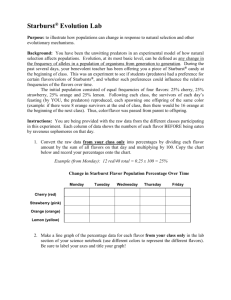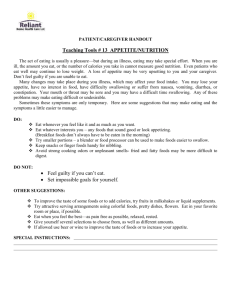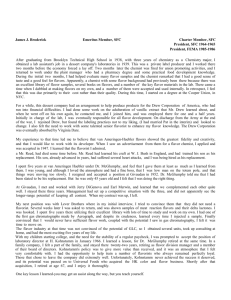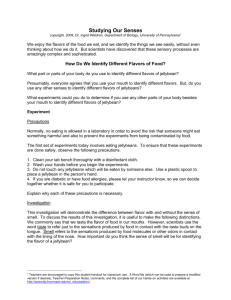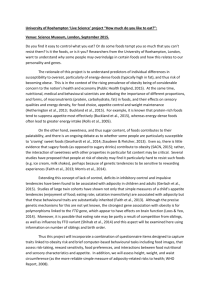2005-12-18 Weight Loss Resolution?
advertisement
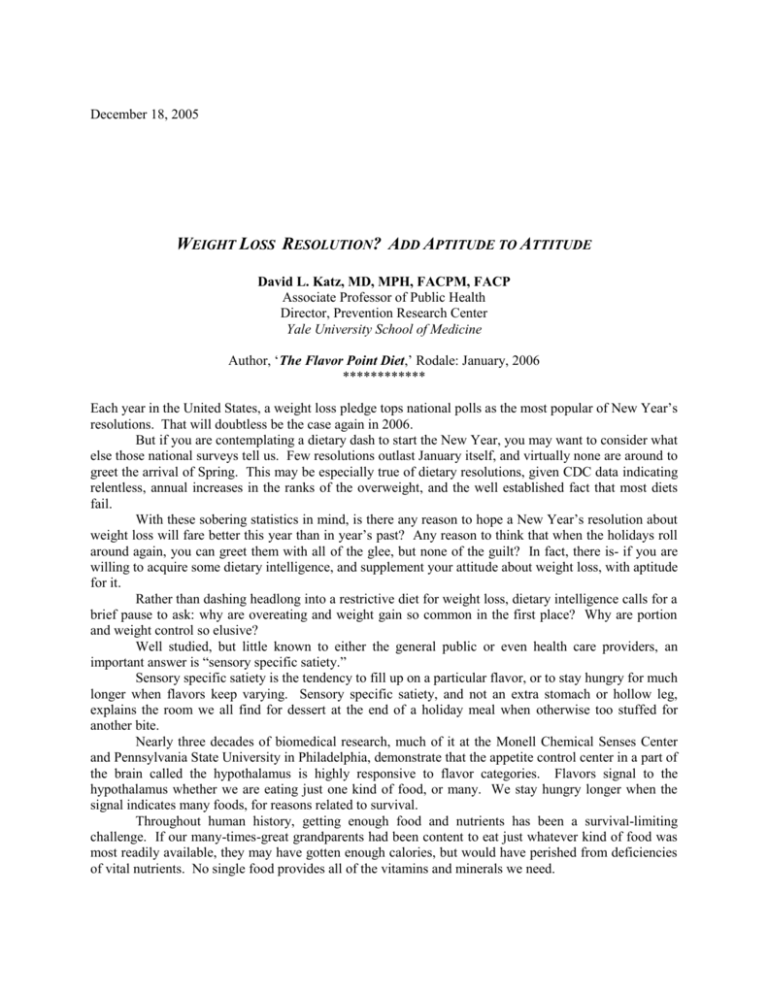
December 18, 2005 WEIGHT LOSS RESOLUTION? ADD APTITUDE TO ATTITUDE David L. Katz, MD, MPH, FACPM, FACP Associate Professor of Public Health Director, Prevention Research Center Yale University School of Medicine Author, ‘The Flavor Point Diet,’ Rodale: January, 2006 ************ Each year in the United States, a weight loss pledge tops national polls as the most popular of New Year’s resolutions. That will doubtless be the case again in 2006. But if you are contemplating a dietary dash to start the New Year, you may want to consider what else those national surveys tell us. Few resolutions outlast January itself, and virtually none are around to greet the arrival of Spring. This may be especially true of dietary resolutions, given CDC data indicating relentless, annual increases in the ranks of the overweight, and the well established fact that most diets fail. With these sobering statistics in mind, is there any reason to hope a New Year’s resolution about weight loss will fare better this year than in year’s past? Any reason to think that when the holidays roll around again, you can greet them with all of the glee, but none of the guilt? In fact, there is- if you are willing to acquire some dietary intelligence, and supplement your attitude about weight loss, with aptitude for it. Rather than dashing headlong into a restrictive diet for weight loss, dietary intelligence calls for a brief pause to ask: why are overeating and weight gain so common in the first place? Why are portion and weight control so elusive? Well studied, but little known to either the general public or even health care providers, an important answer is “sensory specific satiety.” Sensory specific satiety is the tendency to fill up on a particular flavor, or to stay hungry for much longer when flavors keep varying. Sensory specific satiety, and not an extra stomach or hollow leg, explains the room we all find for dessert at the end of a holiday meal when otherwise too stuffed for another bite. Nearly three decades of biomedical research, much of it at the Monell Chemical Senses Center and Pennsylvania State University in Philadelphia, demonstrate that the appetite control center in a part of the brain called the hypothalamus is highly responsive to flavor categories. Flavors signal to the hypothalamus whether we are eating just one kind of food, or many. We stay hungry longer when the signal indicates many foods, for reasons related to survival. Throughout human history, getting enough food and nutrients has been a survival-limiting challenge. If our many-times-great grandparents had been content to eat just whatever kind of food was most readily available, they may have gotten enough calories, but would have perished from deficiencies of vital nutrients. No single food provides all of the vitamins and minerals we need. So survival favored the tendency to stop eating sooner when a limited variety of foods was available, and to keep eating, and eating, when a greater variety of foods was at hand. Since this tendency resulted in survival, and survival is required to pass one’s genes along to the next generation, we are all the offspring of people with sensory specific satiety hard-wired into their brains. This trait is clearly not unique to humans. Almost any animal species studied tends to overeat and get fat when offered an excessive diversity of flavors at all times. You may know this from first-hand experience if you have a cat or a dog. Leave out their food all day, and they eat when hungry, stop when full. Supplement their standard food with a variety of table scraps, and they will eagerly eat their way to obesity. The challenge of sensory specific satiety and its powerful, primitive influence on appetite is not just about a variety of foods; it’s also about variety within foods! Processed foods are cleverly “spiked” with hidden flavors. Most sweet foods, from breakfast cereals to desserts, contain large quantities of added salt. Most salty items contain large quantities of added sugar. And almost everything in a box, bag, or jar harbors an excessively long ingredient list inclusive of not just sugar in combination with salt, but also shrewdly designed artificial flavor enhancers. The net result of all this? We all stay hungry far longer than is good for us. We get fat, while the food companies get flush. But that can all change. Because sensory specific satiety is not just vulnerability, it is strength. It’s all in knowing how to use it. The thoughtful distribution of flavors can do to the appetite center of the brain what music is famous for doing to a savage breast: soothing, and satisfying it. The simple, profound, unrecognized truth is this: by distributing flavors thoughtfully, and by achieving a variety of flavors over time while avoiding an excessive variety of flavors at any one time, you can and will fill up on fewer calories. Will this reduce the pleasure you get from food? Quite the contrary. After all, it isn’t the number of notes that makes music; it’s how they are distributed. A harmonious distribution of flavors eliminates the nutritional equivalent of noise, and makes eating more pleasurable, not less. Most of the world’s great cuisines, and top chefs, emphasize a harmonious blend of compatible flavors. But even with pleasure enhanced, you will fill up on fewer calories, and the implications of that are remarkable. You can lose weight, without being hungry. You can admit that calories count, and still not have to count calories. You can “diet,” without cutting out any foods or food categories. You can lose weight while maintaining a perfectly balanced, healthful, pleasurable diet at all times. You can go on a diet of thoughtfully distributed flavors, and take your whole family along, because at no point do you need to trade off optimal nutrition for weight loss. That is vital, because in this age of epidemic childhood obesity, the unit of commitment to better nutrition should be the family, not the individual. The complete details on how to adopt this empowering, intelligence-based approach to food, health, and weight control, are the subject of my latest book. Here are some tips to get you started right away: Strive for variety of foods and flavors over time, while avoiding too much variety at any one time. Consider the use of a “flavor theme” to harmonize the dishes in a meal. When shopping, in any given category of packaged food, look for and choose the item with the shortest ingredient list to avoid superfluous flavor additions. There is much about the modern environment that can and should be changed to make eating well, and being physically active, with resultant weight control, the path of least resistance- rather than the uphill battle they are now. But rather than waiting for the world to change around you, you can empower yourself with knowledge and strategies to get around the obstacles the world puts in your way. The single most important thing about food is how it tastes. It should come as no surprise that the appetite center in our brains has been hard-wired to be responsive to flavor. The thoughtful distribution of flavors soothes the savage appetite center. Amidst the holiday carols, and in anticipation of Auld Lang Syne- that should be music to your ears! By understanding and using the neuroscience of appetite regulation to your advantage, you can enjoy food, pursue health, control weight, and avoid unwanted hunger- for yourself, and your family. By resolving to apply some dietary intelligence, you can clear a way this January that your will for weight control can actually follow for the long term. -fin David L. Katz, MD, MPH, FACPM, FACP is Director of the Yale Prevention Research Center, and author of ‘The Flavor Point Diet,’ (Rodale) now in bookstores nationwide (www.flavorpointdiet.com) ********************************** David L. Katz, MD, MPH, FACPM, FACP Associate Professor of Public Health Director, Prevention Research Center Yale University School of Medicine Associate Director, Nutrition Science Rudd Center for Food Policy & Obesity Yale University Medical Contributor, ABC News Prevention Research Center 130 Division St. Derby, CT 06418 Phone: Work: (203) 732-7194 Home: (203) 288-2228 Cell: (203) 671-6863 Fax: (203) 732-1264 Katzdl@pol.net; david.katz@yale.edu Administrative assistant: Helen Day: helen.day@yalegriffinprc.org ******************************************************

